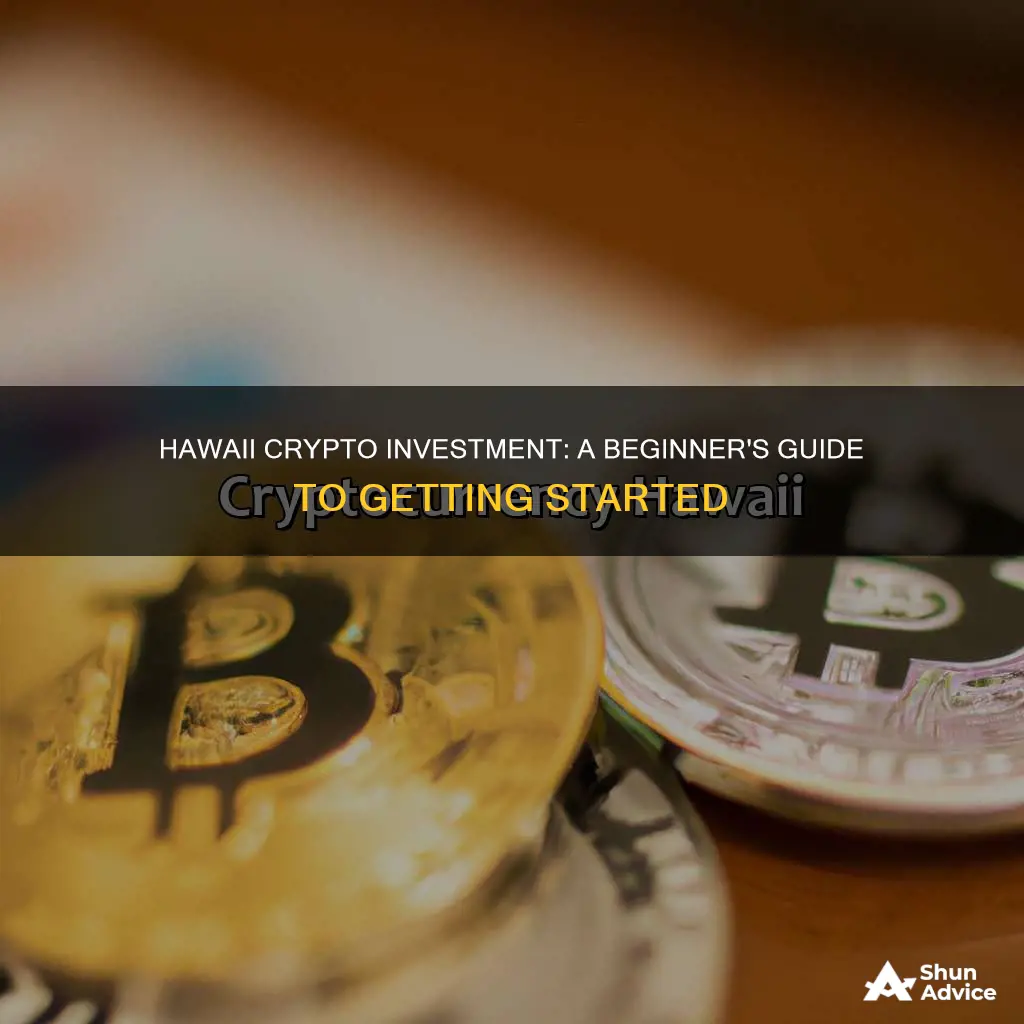
Hawaii has recently relaxed its strict crypto rules, but the regulatory environment is still a challenge for crypto exchanges. While it is legal to buy and sell crypto in Hawaii, the state's previous stringent requirements for money transmitter licenses and cash reserves have deterred major exchanges like Coinbase and Binance from operating in the state. However, there are still several options available for residents interested in investing in cryptocurrencies. These include both US-based and international exchanges such as Kraken, Gemini, and Uphold, as well as peer-to-peer trading sites and e-wallet providers. It's important to note that the regulatory landscape in Hawaii is evolving, and the future availability of exchanges may depend on upcoming legislative decisions.
| Characteristics | Values |
|---|---|
| Legality of crypto in Hawaii | It is legal to buy and sell crypto in Hawaii |
| Crypto exchange options | Kraken, Bitstamp, Gemini, Coinmama, Crypto.com, Uphold, SoFi, BlockFi, Binance, Bitcoin IRA, Unchained, River, Robinhood |
| Regulatory environment | Heavy restrictions, but recently loosened |
| Regulatory changes | The Digital Currency Innovation Lab (DCIL) pilot program is set to end on June 30, 2024, allowing crypto companies to operate without a Hawaii-issued money transmitter license |
| Crypto taxes | No state guidance on crypto taxes; treated as property by the IRS |
| Crypto wallets | Recommended to use a non-custodial/hardware wallet for better security |
| Crypto scams | Common in Hawaii, including fake electric company threats and cryptocurrency scams |
What You'll Learn

Crypto exchanges in Hawaii: Kraken, Gemini, Uphold, etc
Hawaii has recently dropped its strict crypto laws, which means more exchanges are expected to enter the market. However, as of now, there are a handful of crypto exchanges that Hawaiians can use to buy and sell cryptocurrencies. Here are some of the notable ones:
Kraken
Kraken is a well-known and established cryptocurrency exchange that offers features for both beginner and advanced crypto investors. It has an intuitive user interface, making it easy for beginners to navigate and make their first crypto purchase. Kraken also offers advanced trading features, such as futures contracts and margin trading, for seasoned investors. The exchange supports over 200 crypto assets and is registered as a Money Service Business (MSB) with FinCEN compliance.
Gemini
Gemini is one of the most trusted and regulated crypto exchanges in the USA. It has been available to Hawaii residents since August 2020 and offers an easy and secure way to buy, sell, and store cryptocurrencies. Gemini supports a wide range of cryptocurrencies, including Bitcoin, Ethereum, and Zcash. It also has low fees, starting at $0.99 for a transaction of up to $10. Gemini is a participant in the Hawaii Digital Currency Innovation Lab (DCIL), a two-year pilot program that allows companies to operate in the state without a money transmitter license.
Uphold
Uphold is a digital asset platform based in Silicon Valley and founded in 2013. It serves over 7 million users in 180+ countries and offers trading between cryptocurrencies, precious metals, and national currencies. Uphold supports a range of cryptocurrencies, including Bitcoin, Ethereum, and Cardano. Users can fund their accounts through various methods, such as bank transfers, credit/debit cards, and crypto wallets. Uphold was one of the four companies admitted into the second cohort of Hawaii's DCIL program in 2021, allowing it to operate in the state.
Other Exchanges
In addition to the above-mentioned exchanges, Hawaiians can also use other platforms like Bitstamp, Coinmama, River, and Crypto.com. Additionally, peer-to-peer crypto trading sites like LocalBitcoins.com and e-wallet providers like Skrill are also options for buying and selling cryptocurrencies in Hawaii.
EPS Coin: A Smart Investment Choice?
You may want to see also

Crypto wallets: MetaMask, Exodus, Ledger Nano X, etc
Crypto wallets are essential for investing in cryptocurrencies. They allow you to store, manage, and secure your digital assets. Here is an overview of some popular crypto wallet options:
MetaMask
MetaMask is a self-custodial crypto wallet that serves as a gateway to blockchain apps. It is available as a browser extension and a mobile app. MetaMask provides a secure login, key vault, token wallet, and more, giving you the tools to manage your digital assets. It is trusted by over 100 million users worldwide and allows you to explore blockchain applications with control over your data and privacy. MetaMask generates passwords and keys on your device, ensuring that only you have access to your accounts.
Exodus
Exodus is a beginner-friendly crypto wallet with a simple and intuitive interface. It supports 50+ networks, including Ethereum, Solana, and BSC, and allows you to swap between thousands of assets. You can buy, sell, and manage your crypto on desktop and mobile devices. Exodus also offers an all-in-one hardware wallet, the Exodus Trezor, which provides an additional layer of security by keeping your assets securely offline.
Ledger Nano X
The Ledger Nano X is a hardware crypto wallet that connects to your phone via Bluetooth. It has a large screen and is designed to be easy to use on the go. With the Ledger Nano X, you can manage over 5,500 coins and tokens, including Bitcoin, Ethereum, XRP, and more. It offers the highest level of security by keeping your private keys and assets offline and independent of third parties. The Ledger Live app provides additional functionality, allowing you to buy, sell, and swap crypto assets.
ADA Coin: A Smart Investment Decision?
You may want to see also

Crypto coins available in Hawaii: BTC, ETH, ADA, DOGE, etc
Cryptocurrency is growing in popularity in Hawaii, and the state has loosened its restrictions on crypto exchanges. While you can't use every exchange that is available in the rest of the US, there are still several options for buying and selling crypto in Hawaii. These include:
- Uphold
- Kraken
- Gemini
- Crypto.com
- River
- Bitcoin IRA
- Unchained
Each of these platforms has different features, fees, and coins available for trading. For example, Uphold allows users to trade between cryptocurrencies, precious metals, and national currencies, including BTC, ETH, and ADA. Meanwhile, Gemini supports a range of cryptocurrencies, including BTC, ETH, and SOL, and offers some of the lowest fees in the US and Canada.
In addition to these platforms, Hawaiians can also buy crypto through Bitcoin ATMs. There are currently five Bitcoin ATMs in Hawaii, although transactions can come with a 3% to 5% markup.
It's important to note that the crypto market is highly volatile, and there are risks associated with investing in any cryptocurrency. Be sure to do your research and only invest what you can afford to lose.
Who's Buying Bitcoin? Institutional Investment Firm Roundup
You may want to see also

Crypto regulations in Hawaii: DCIL, KYC, AML, etc
Crypto regulations in Hawaii have been a dynamic field, with the state recently relaxing some of its strict rules. Here is an overview of the key regulations:
Digital Currency Innovation Lab (DCIL):
Hawaii's DCIL was a pilot program that allowed select crypto businesses to operate in the state without a money transmitter license. The program was initiated in 2020 and has since undergone extensions, with the latest scheduled conclusion set for June 30, 2024. DCIL participants were exempt from the state's previous requirement for crypto exchanges to hold cash reserves equal to their digital assets.
Know Your Customer (KYC) and Anti-Money Laundering (AML) Regulations:
All licensed crypto exchanges in Hawaii must comply with KYC and AML regulations. These regulations require users to provide proof of a government-issued ID, their social security number, and other information to verify their identity when signing up.
Money Transmitter License:
Hawaii's Money Transmitter Law considers cryptocurrency transactions as money transmission and requires companies dealing in virtual currencies to obtain a money transmitter license. This law has made it challenging for crypto exchanges to operate in the state, as they must comply with stringent requirements.
Taxation:
Hawaii does not provide specific guidance on state taxation for cryptocurrency transactions. However, the Internal Revenue Service (IRS) considers cryptocurrencies as property, and residents are required to follow the tax rules for property transactions. This includes reporting capital gains or losses when exchanging crypto for fiat currency, another cryptocurrency, or receiving rewards.
Scams and Security:
Hawaii has seen its share of crypto scams, including fake electric company threats and scams posing as law enforcement. The state's authorities have cautioned residents about the risks and advised them to secure their crypto wallets and be vigilant against fraudulent activities.
Miami Coin: A Smart Investment Decision?
You may want to see also

Crypto taxes in Hawaii: capital gains, property transactions, etc
Crypto investors in Hawaii need to be aware of the state's high taxes and strict regulations. While the state has recently relaxed some of its crypto restrictions, allowing more exchanges to operate within its borders, it still has some of the highest state taxes in the country.
Crypto Taxes in Hawaii
Hawaii levies taxes on income and capital gains. Income tax rates range from 1.4% to 11%, while capital gains are taxed at a rate of 7.25%. These rates are among the highest in the country, making Hawaii one of the least tax-friendly states for crypto investors.
Capital Gains
When you dispose of cryptocurrency, you may incur a capital gain or loss, depending on how the price of the crypto has changed since you acquired it. Disposing of crypto can include selling it, trading it for other cryptocurrencies, or using it to make a purchase. The length of time you held the crypto will determine whether your capital gain or loss is short-term or long-term. If you held the crypto for one year or less, you will have a short-term capital gain or loss. If you held it for more than a year, you will have a long-term capital gain or loss. The gain or loss is calculated as the difference between the adjusted basis of the crypto and the amount received in exchange. This amount needs to be reported on your federal income tax return in US dollars.
Crypto as Property
It is important to note that the IRS considers cryptocurrencies to be property, not currency. As such, crypto transactions are taxed in the same way as property transactions. This means that any gains or losses from crypto investments are subject to capital gains taxes. Additionally, if you receive crypto as payment for services, it is considered ordinary income and must be reported as such on your tax return.
Other Crypto-Related Taxes
In addition to capital gains and income taxes, there may be other taxes related to crypto transactions. For example, if you use a crypto debit card to make purchases, you may be taxed on the gains from those transactions. Similarly, if you earn staking rewards, mining rewards, or airdrop rewards, these would be considered ordinary income and would be subject to income tax.
Crypto Tax Software
To help with the complex task of calculating and filing crypto taxes, investors can turn to crypto tax software. These tools can track, manage, and calculate crypto-related taxes, making it easier to comply with tax regulations.
Mark Cuban's Dogecoin Bet: Millions Invested
You may want to see also
Frequently asked questions
There are several crypto exchanges, both US-based and international, that Hawaii residents can use to buy cryptocurrency. Some of the popular ones are Kraken, Bitstamp, Gemini, and Uphold.
The cheapest way to buy crypto in Hawaii is through the online crypto exchange Gemini.
There is no single best way to get cryptocurrency in Hawaii. If you are looking for the lowest fees, Gemini is a good option. If you want access to a wider variety of crypto financial services, BlockFi might be a better choice.







